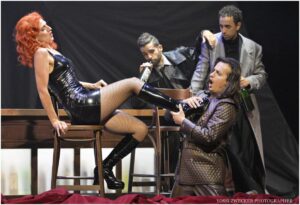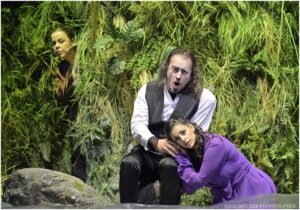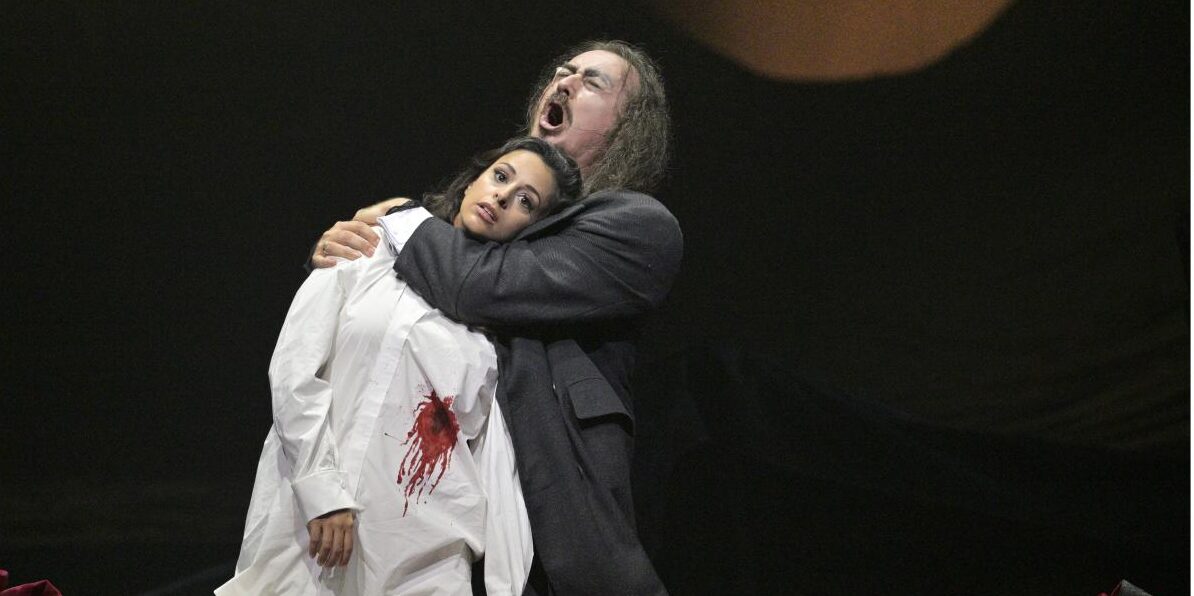I have a special place in my heart for Rigoletto. This is due to a personal memory. When I was a film student, I wrote a paper about Bernardo Bertolucci’s Strategia del ragno. The film tells the story of a young man who returns to the town where his father was killed before his birth. There he finds out that in 1936 his father planned to blow up Benito Mussolini in the local theatre, during a performance of Rigoletto, but instead ended up being murdered himself by his fellow conspirators. As Bertolucci incorporated Italian operas in many of his movies, I had a hunch Rigoletto was chosen as a backdrop for the central scene because of some connection to the film’s plot, but I didn’t know the opera and it was before the internet. So, I went to visit my grandmother, who was an opera buff, and asked her to tell me about Rigoletto. As she reached the part in the story where Gilda sacrifices herself to save the duke, I found the metaphoric connection I was looking for.
Musically, Verdi’s 1851 opera, based on a scandalous play by Victor Hugo (which was banned in France until 1882), is a Chock full o’Hits. This tragic story of a womanizing duke who seduces a naïve virgin, and of her father, the hunchbacked court jester, who plans a revenge that goes wrong, was given an only partly satisfying treatment by the current production at the Israeli Opera. Originally directed by Miguel del Arco for Spanish opera houses, and brought to the Tel Aviv stage by Regina Alexandrovskaya, this modern production looked mostly worn out (though it must have looked like this to begin with).
The opening scene, taking place during a ball in the duke’s palace, was spare but impressive. The set’s only component was lush red velvet drapes in the background and the stage was filled with men in black tuxedos and female dancers in golden miniskirts. The duke arrived in a sexy white suite and looked great, but when Italian tenor Oreste Cosimo started singing his first aria “Questa o quella”, about a life of pleasure with as many women as possible, his voice sounded muffled, as if he was singing from behind the stage. It was quite disappointing as I have heard him singing better in Lucia di Lammermoor. It seems Cosimo was saving his voice for the third act, in which he sang his most famous aria, “La donna è mobile”, with more rigor.

Up until then it was up to the other two leads to carry the music, and they did so beautifully. Israeli soprano Hila Fahima was lovely as the very young and very naïve Gilda, who does not know why her father is hiding her from the world, and especially from the duke. She sang every note with intent and her beautiful clear voice did not betray her like the duke. Romanian baritone Ionut Pascu was also good in the title role as the clown who turns against his master, and his passion for vendetta takes over his common sense and ruins his and his daughter’s life, while the duke is never harmed. Pascu, a regular at the Israeli opera since 2011, has a big voice and his anguish filled the stage. Also worth mentioning were Korean bass-baritone Changdai Park in his Israeli opera debut as Count Monterone, and Greek bass Petros Magoulas as the murder for hire Sparafucile. Both sang very well and were convincing in their short time on the stage.

However, the wretched set design by Numen/For Use made it difficult to be drawn in by the drama. Rigoletto’s house in the second scene was a haggard mix of green plants, unconvincingly put together, and a plastic sheet. Gilda’s purple dress was also an eye sore. Later, the envisioning of Sparafucile’s tavern as a tent made more sense, but when it came down for no apparent reason, the stage looked a mess. The one image that does stick in mind is of the men in the chorus wearing eerie rabbit masks, reminiscent of the scary rabbit in Donnie Darko, when they kidnap Gilda.
The men of the Israeli Opera Chorus were excellent, and after a slightly creaky start, conductor Matteo Beltrami lead the orchestra with energy and precision. If only the set didn’t thwart the singers, this could have been a more memorable production.
The Israeli Opera Tel-Aviv-Yafo האופרה הישראלית תל-אביב-יפו
Opera
Music by Giuseppe Verdi
Original Director: Miguel del Arco
Director: Regina Alexandrovskaya
Set Designer: Numen/For Use
Conductor: Matteo Beltrami
Sung in Italian with Hebrew and English surtitles
Cast includes Hila Fahima, Oreste Cosimo, Ionut Pascu
Running time: 3hrs including 2 intervals
Photo credit: Yossi Zwecker

